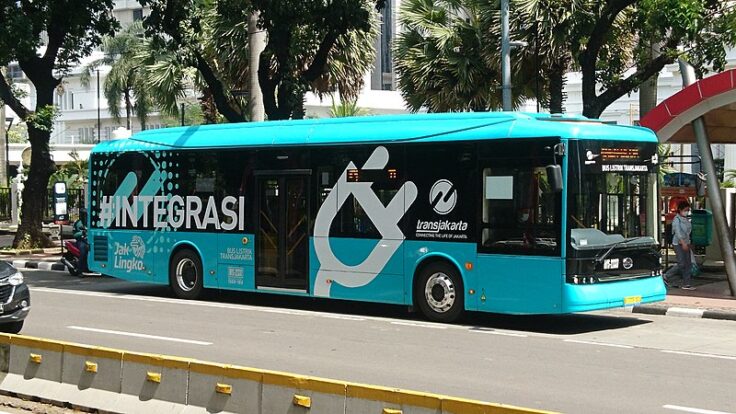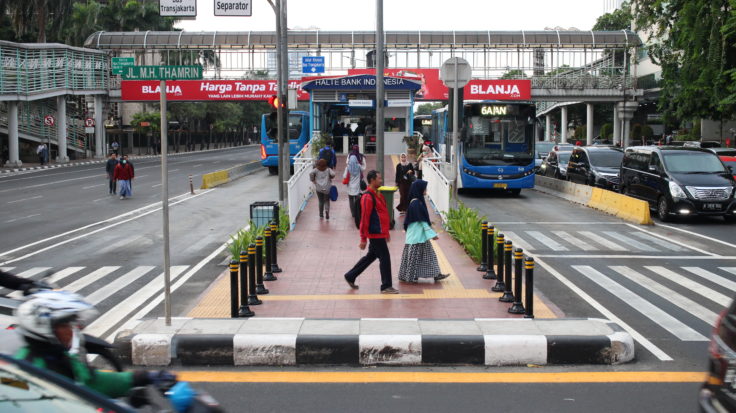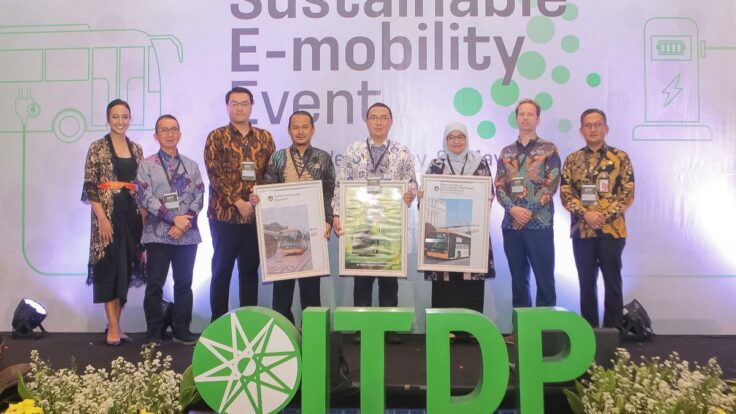July 25, 2023
In Jakarta, New Studies Find Bus Electrification is Both Feasible and Urgent
The Government of Jakarta has committed to electrifying 100% of its Transjakarta bus fleet by 2030, which amounts to over 10,000 vehicles.
Access ITDP Indonesia and UK PACT’s e-bus report and related materials here.

ITDP Indonesia has been collaborating with the Provincial Government of DKI Jakarta since 2000, providing transport officials with technical expertise, direct advocacy, and policy guidance to help the region mitigate the impacts of urban transport emissions, improve air quality, and create more livable and equitable communities. A large part of the region’s sustainable transport strategy is to advance the full-scale electrification of its public bus system, which includes a recent pilot deploying 100 e-buses and a commitment to stop procuring conventional fossil fuel buses by 2025.
Since 2020, ITDP Indonesia has been supporting Transjakarta’s electric vehicle transition by conducting studies and providing strategic technical assistance to make progress on the region’s electrification targets. In that same year, with ITDP’s support, Transjakarta achieved a major milestone: one million riders per day on its systems. This was a hard-won achievement, attained through a combination of service improvements, mobility integration, and enforcement.
Now, the spotlight is on ensuring that the extensive system maintains its level of service and efficiency while also making the much-needed transition to more sustainable and modern electric vehicles. This work has culminated in a landmark report from ITDP Indonesia and UK PACT released earlier this year, A Business Case of Transjakarta’s First Phase E-Bus Deployment, which finds that the large-scale electrification of Transjakarta is not just financially feasible, but offers significant climate, economic, and social benefits. Public and private sector commitments to this transition is especially urgent, considering that Jakarta is Indonesia’s largest and most populated city, if the country is to achieve its ambitious greenhouse gas (GHG) emissions targets over the next decade.

Learn more about Jakarta’s innovative mobility strategies in this 2021 MOBILIZE case study.
The report addresses the challenges of regulatory precedents, up-front costs, and technological complexities that have been holding back investment into Transjakarta’s transition, while offering evidence to show that electrification is both viable and valuable from an environmental and economic perspective. The report’s recommendations and guidance provides a strategic foundation for the Government of Jakarta to achieve its electrification targets by 2030, focusing on the key areas of capacity building, financial planning, and policy development. It is projected that the full-scale electrification of Transjakarta’s bus fleet by 2030 can generate a net economic and social benefit of IDR 4.2 trillion (nearly $280 million USD) cumulatively, while reducing nearly 60% of GHG emissions compared to a Business-as-Usual (BaU) scenario.
In addition to putting forth a business case for electrification, exploring financing scenarios, and presenting a regulatory framework, the report also gives priority to Gender Equality and Social Inclusion (GESI) strategies as a pillar of the transition. The focus of GESI is to improve Transjakarta’s gender responsiveness and accessibility measures throughout the planning and implementation phases, with a particular focus on people with disabilities, women, and other often marginalized groups. Such considerations are critical to ensuring that the future of Transjakarta’s services are not just sustainable, but also inclusive and reflective of all of its user groups.

The published materials from the study and report include:
- A roadmap for the implementation of electric bus fleets;
- Strategies for strengthening regulations and policies regarding electrification;
- Alternative funding schemes for electrification;
- A full business case (FBC) for implementation; and
- An “Electric Bus Planning Toolkit”, which includes a Gender-Impact Assessment (GIA).
These materials were collectively presented to high-level transport and government officials and other stakeholders at a formal event in May 2023 entitled Sustainable E-Mobility Event: Lessons Learned from Jakarta. Notable participants included Tonny Agus Setiono, Head of Sub-Directorate Urban Transport, Directorate of Land Transportation, Government of Indonesia; Dr. Sri Haryati, Undersecretary for Economic Affairs and Finance, Office of the Governor of Jakarta; and the event’s keynote speaker Matthew Downing, the UK’s Deputy Head of Mission to Indonesia and Timor Leste.
“This study is the result of intense collaboration over several years between the Jakarta Provincial Government, UK PACT, and ITDP Indonesia… this study will contribute to accelerating Jakarta’s targets to develop low-carbon transportation that is accessible to everyone, especially communities most in-need.”
— Matthew Downing, UK Deputy Head of Mission to Indonesia and Timor Leste
Download an Executive Summary of the study in English.
Access all the report materials in Bahasa.
View a video recap of the Sustainable E-Mobility Event below.
